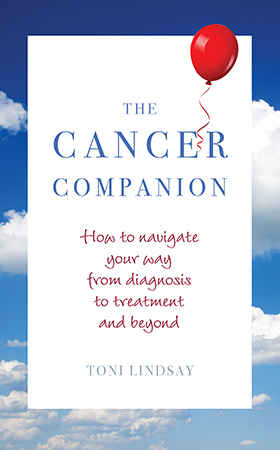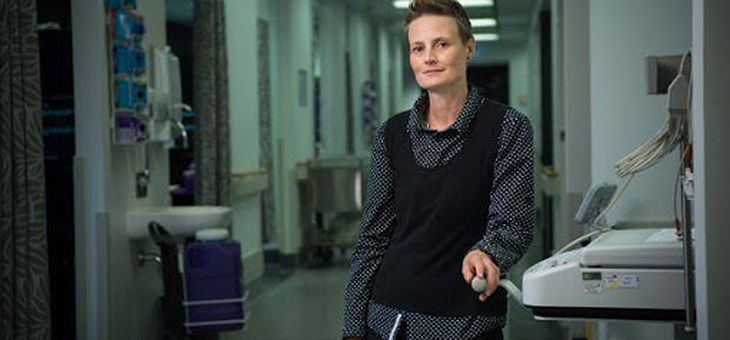Psychologist Dr Toni Lindsay, author of the newly released Cancer Companion (Exisle 2021), offers some guidance for those newly diagnosed with cancer to help navigate the maze of emotions, uncertainty and information that accompany this unfamiliar landscape.
—
Research has shown that after people hear the word ‘cancer’ they don’t hear anything else in the consultation, and it will often take several appointments with their doctors to start to make sense of what they are hearing. The way people manage this will be different from person to person; but most people, as with any other shocking bad news, are likely to feel quite numb and disconnected to start with.
In my practice I often talk about the ’72-hour window’ or the time it takes to process this kind of information. For the first couple of days after people receive such information they usually aren’t able to process it, not in any real way. They are likely to cry, be shocked, distressed, angry, sad, insulated and sombre or, even more likely, a combination of all these things. It may also be at this time that things such as sleep, appetite and attention span change temporarily, with people feeling like they just want to be distracted and a bit disconnected from what is going on. Grief and the processing of life events rarely happen in any type of linear way, so people will oscillate through some or all of these emotions, often shifting from one to the other within moments or hours.
At these times, it is about moving through the emotions and letting them be rather than trying to do anything else. This process is part of your brain doing its work rather than anything to be worried about. But it will feel different to how you generally feel. Take the time you need to make sense of whatever you need to make sense of. This might happen multiple times through the cancer process, not just at the beginning – it might happen if you are given new information about the next lot of treatment, or a particular plan, or when you finish treatment, or if your cancer returns. And each time this happens it will feel as disconcerting and unfamiliar as the last. It’s worth reminding yourself that this is what is meant to happen, and it will come to an end.
Read more: Have you put your life in safe hands?
“I kept expecting that I would do something or feel something. Instead I just watched movie after movie and didn’t think about it at all.” – Angelo, 56 years old
After the 72-hour window you are likely to have some more clarity of thought, and the shock will have subsided somewhat. This is also the time in cancer land where you may be more likely to have a bit of a plan forming for what happens next. This might be about having a treatment plan, or a discussion about further review by other people. This might be the time when your brain goes into practical and planning mode, which is one of the things that will largely help you manage through the next months of treatment, or whatever might come next. This is the time when, instead of being completely overwhelmed by the idea of uncertainty and panic, your brain will help you by shifting towards thoughts about how to navigate the next steps.
Read more: New treatments for high blood pressure?
Behind the scenes
When someone is diagnosed it might initially feel like there is not much happening – perhaps they are getting sent for lots of scans and tests, and it might feel like an eternity between appointments where there is information being given.
Patients tell me that the time when it feels like nothing is happening is actually the time when lots of things are happening – you might just not know about them. At many hospitals and for most cancers there will be a group of people who will get together and talk about what is going to happen next for you. This is called a Multidisciplinary Team (or the MDT). This group usually includes oncologists, surgeons, pathologists, radiation oncologists, specialist nurses and psychosocial members. A member of the team (usually the person you have been referred to) will take your case to the meeting and seek the opinions of the others to ensure your treatment plan takes everything into account, and that all aspects of making sure you get the most effective treatment are covered off.
So, although it feels like nothing is happening and you might even be worried they have forgotten about you, it’s much more likely that a plan is being discussed and organised.
Read more: The plan that could make Australia the world’s healthiest country
“I just felt so desperate for someone to tell me it would all be okay. I was reading everything I could find. In the end, I realised all it was doing was making me realize that I wouldn’t find an answer.” – Liz, 50 years old
Beware of Dr Google: navigating through information
This can be the time when people start researching things like crazy, and I tell you, Dr Google has quite a lot to answer for.
We like to have answers and certainty, and you have just found yourself in the biggest pile of uncertainty you have likely ever encountered. Your brain will be flooded with thoughts about the future and what is going to happen next. I suspect thoughts and worries about whether you are going to die have started to be very present. So it makes perfect sense that in this uncertainty you would seek answers, right? And who can provide the answers? The internet. There are many difficulties with this, but here are the main issues:
Counterintuitively, the information on the internet about cancer and its treatments is often quite out of date.
The information you find isn’t likely to be relevant to you, as cancer and its treatments are so individual, based on factors that your doctors and treating teams will take into account and that you might not even be aware of.
As a general rule, people don’t talk about how great things are going when they talk about cancer on the internet. In all likelihood you will find yourself presented with a bunch of stories and experiences that are not representative of most people, and skewed very much towards how bad things can be. If you put any cancer type and the words ‘survival’ into Google, it is likely that within the first pages and results, you will be presented concurrently with the word ‘death’. This is in no way representative of your actual survival statistics.
When people go searching for answers to reassure their brains, they actually start to spin out more, a bit like a car stuck in the mud trying to get traction with its back wheels. So just like the car stuck in the mud, instead of trying to get out, you might be better off stopping and waiting for help to arrive. In the instance of cancer, that help is likely to be from your treating team, who will tell you what you need to know and give you a plan.
Write down your questions
Just after you get the news about the cancer (or whatever other information you might be trying to process) and before treatment starts, it is likely you will have lots of questions and worries. People tend to have many questions for their doctors between appointments, but then forget them the second they are sitting in the room; they then leave the consultation kicking themselves that they didn’t get the information they needed.
In order to manage this, the simplest thing to do is to write some questions down before you go to your appointment and take some paper to write down the answers. Some doctors might be happy for you to record the consults so that you can listen back later, in case you miss the information. Also, if you can, take someone with you; they will probably miss some of the info as well, but at least with multiple sets of ears in the room the chance that most of the important stuff will be heard will increase.
The ways in which people process information and manage the time before starting treatment will look really different. It is about finding the way that makes the most sense for you. Some people manage by thinking endlessly about the cancer and what might happen next for them. But others might completely disconnect and appear not to be thinking about it at all. You might fall somewhere in between these two extremes, or it might change over time. In most cases, even if it appears that you aren’t thinking about it, you probably will be thinking about it, rolling it around in the background of your brain without you realising. Lots of people around you are likely to have ideas about what you should be doing, but I would say it is worth listening to your own brain and body on this one.
And if you feel as if you are freaking out and don’t know which way is up, that is okay too.
Dr Toni Lindsay is a clinical and health psychologist who has been working with adults and adolescents for more than 10 years. She works at Chris O’Brien Lifehouse in the oncology and haematology departments. Her new book, The Cancer Companion, is available wherever good books are sold and from https://exislepublishing.com/product/the-cancer-companion/

Have you or a loved one ever had to deal with a cancer diagnosis? How did you handle it? Why not share your thoughts in the comments section below?
If you enjoy our content, don’t keep it to yourself. Share our free eNews with your friends and encourage them to sign up.

